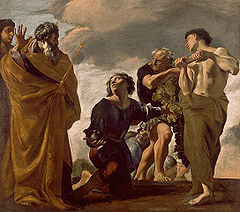- Shooting the messenger
-
"Shooting the messenger" is a metaphoric phrase used to describe the act of lashing out at the (blameless) bearer of bad news.
 Moses and the Messengers from Canaan (painting by Giovanni Lanfranco)
Moses and the Messengers from Canaan (painting by Giovanni Lanfranco)
In earlier times, messages were usually delivered in person by a human envoy. Sometimes, as in war, for example, the messenger was sent from the enemy camp. An easily provoked combatant receiving such an overture could more easily vent anger (or otherwise retaliate) on the deliverer of the unpopular message than on its author.
In modern usage, the expression still refers to any kind of punishment meted out to the person bringing bad news, but has taken on an ironic dimension as well. Nevertheless "it is still worth a man's neck to disturb an emperor's image. Nowadays the axe falls more subtly and the execution may be postponed, but sooner or later it comes".[1]
"Attacking the messenger" is a subdivision of the ad hominem logical fallacy.
Contents
Origins of the concept
The advice "Don't shoot the messenger" was first expressed (very obliquely) by Shakespeare in Henry IV, part 2 (1598)[2] and in Antony and Cleopatra: when told Antony has married another, Cleopatra threatens to treat the messenger's eyes as balls, eliciting the response 'gracious madam, I that do bring the news made not the match'.[3] Prior to that, a related sentiment was expressed in Antigone by Sophocles as "No one loves the messenger who brings bad news".[4]
Plutarch's Lives has this line: "The first messenger that gave notice of Lucullus's coming was so far from pleasing Tigranes that he had his head cut off for his pains; and no man daring to bring further information, without any intelligence at all, Tigranes sat while war was already blazing around him, giving ear only to those who flattered him...".[5]
An analogy of the phrase can come from the breaching of an invisible code of conduct in war, where a commanding officer was expected to receive and send back emissaries or diplomatic envoys sent by the enemy unharmed. During the early Warring States period of China, the concept of chivalry and virtue prevented the executions of messengers sent by opposing sides.
The term also applied to a town crier, an officer of the court who made public pronouncements in the name of the ruling monarch. This often included bad news, such as tax increases. Harming a town crier was considered to be treason.[6]
Freud and defence
Freud considered shooting the messenger a 'marginal case of this kind of defence...of fending off what is distressing or unbearable' - citing the example of 'the famous lament of the Spanish Moors Ay de mi Alhama, which tells how King Boabdil received the news of the fall of his city of Alhama. He feels that this loss means the end of his rule. But he will not "let it be true"...."He threw the letters in the fire and killed the messenger"'.[7]
Freud added that 'a further determinant of this behaviour of the king was his need to combat a feeling of powerlessness. By burning the letters and having the messenger killed he was still trying to show his absolute power'.[8]
Current application
A modern version of attacking the messenger can be seen when persons blame the media for presenting bad news about a favored cause, person, organization, etc. The fact remains that 'shooting the messenger may be a time-honored emotional response to unwelcome news, but it is not a very effective method of remaining well-informed'.[9]
Getting rid of the messenger may also be a tactical move; but the danger is that an ethos of non-disclosure may follow any hostile response to negative feedback. 'People learn very quickly where this is the case, and will studiously avoid giving any negative feedback; thus the "Emperor" continues with the self-delusion....obviously this is not a recipe for success'.[10] Barbara Ehrenreich in Bright-sided/Smile or Die argued that a culture of "thinking positive" so as to 'purge "negative people" from the ranks...[fed into] the bubble-itis '[11] of the late Noughties.
Reaction to whistleblowing organization WikiLeaks led to calls not to shoot the messenger.[12]
Similar phrases
A syntactically similar expression is "Don't shoot the piano player; he's doing the best he can". It originated around 1860 in the Wild West of the United States. During his 1883 tour of the United States, Oscar Wilde saw this saying on a notice in a Leadville, Colorado, saloon. This phrase (like many witty sayings of that era) is sometimes attributed to Mark Twain, but neither Wilde nor Twain ever claimed authorship.
Alternative expressions:
- "Killing the messenger"
- "Attacking the messenger"
- "Blaming the bearer of bad tidings"
See also
- Ad hominem
- Scapegoating
- Whistleblower
References
- ^ Eric Berne, A Layman's Guide to Psychiatry and Psychoanalysis (1976) p. 50
- ^ Act I, scene 1, lines 95-103; "Thou shakest thy head and hold'st it fear or sin to speak a truth. ... Yet the first bringer of unwelcome news hath but a losing office, and his tongue sounds ever after as a sullen bell, remember'd tolling a departed friend."
- ^ II, 5; cf. I, 2 : "The nature of bad news infects the teller."
- ^ (lines 276-277)
- ^ Plutarch's Life of Lucullus (Dryden transl.), paragraph 25; a slightly different account (the messenger was hanged) is in Appian's Mithradatic Wars, paragraph 84
- ^ "Top town crier to be crowned as Hebden Bridge hits 500". BBC. 2010-08-20. http://news.bbc.co.uk/local/bradford/hi/people_and_places/arts_and_culture/newsid_8931000/8931369.stm.
- ^ Sigmund Freud, On Metapsychology (PFL 11) p. 454-5
- ^ Freud, On Metapsychology p. 455
- ^ Bruce W. Sanford, Don't Shoot the Messenger (2001) p. 10
- ^ Mike Robson/Ciaran Beary, Facilitating (1995) p. 135
- ^ Barbar Ehrenreich, Smile or Die (London 2009) p. 188-9
- ^ "Julian Assange: 'Don't Shoot the Messenger'". The Independent. http://www.independent.co.uk/news/uk/crime/julian-assange-dont-shoot-the-messenger-2153616.html. Retrieved 7 January 2011.
Categories:- Injustice
- Metaphors referring to war and violence
Wikimedia Foundation. 2010.
